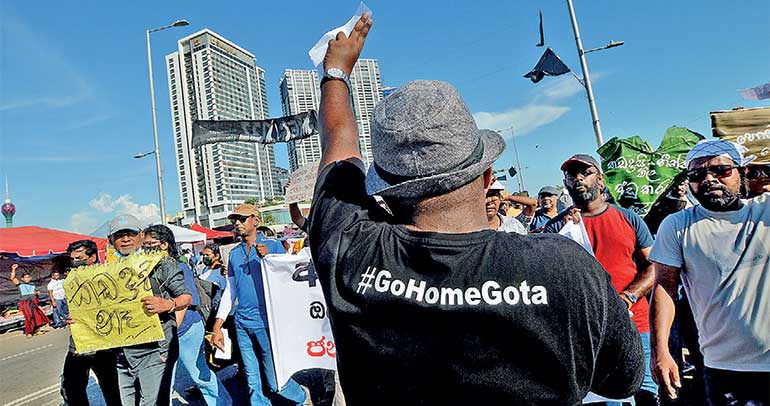Saturday Feb 14, 2026
Saturday Feb 14, 2026
Thursday, 29 December 2022 00:24 - - {{hitsCtrl.values.hits}}

These demands, very clearly demonstrate that a large majority, has challenged the constitutional provisions

Synopsis
A widely spoken subject in parliament debates, political party platforms and particularly the activists of Aragalaya questioned the legitimacy of the constitution and the process that followed in electing the new President, as per the provision of Clause 40(1) and followed by Prime Minister, Cabinet of Ministers and State Ministers. These appointments resulted due to the eviction of then President and the Prime Minister by the people due to a series of wrongdoings, executing not well-thought-out policies, neglect, stubborn attitude, testing people’s patience and silence, thus bringing the country to bankruptcy, creating enormous hardships to more than 90% of the citizens.
Does the eviction of the president fall into, and reasonably classify the description ‘Vacation of Office’? Apparently, there is no prima facie to obey and adhere to the said clause of the constitution. The election of a new President from ‘absolute parliamentary majority’ is now totally distorted to the people’s mandate given to the predecessor in the 2019 presidential election.
The President – Janadipathi
The literal meaning of President is the Head of State; the election of the president is customary by majority peoples’ votes; in Sinhala this clearly manifests the meaning of ‘Janadipathi’, head of the citizens and in turn the head of state. Departing from this accepted norm, electing a president in August 2022 when there was convolution and distortion of public perception and solely based on the mandate of the general election that prevailed in November 2019, executing provisions in the constitution neglecting ground realities is highly questionable and appears to be inappropriate after a lapse of 2.5 years.
In the event of ground realities are unchanged, ceteris paribus, electing the head of state in this manner is beyond contestable. Henceforth, it is to be said that the election of President, PM and the rest of the cabinet is illegitimate despite carrying out Clause 40(1). The continuation of public anger in every corner of the island and Government repression labelling the activists as rebels proves this point beyond doubt.
Constitutional legitimacy
There are multiple opinions about what the constitution means, how it should be interpreted and commonly how it should not be interpreted. This raises the question of legitimacy. As previously pointed out, the process of electing the president leads to challenge the legitimacy and then why was the obligation to believe and follow scrupulously. It is inapt simply to assume and obey without confrontation and thus referring to the Supreme Court (SC) for interpretation. It was unfortunate none of the opposites failed to confront the literal meaning that satisfy ‘Vacation of Office’, assessing the circumstances to which the post became vacant and filed a writ application to SC for interpretation, being the third pillar of the governance that carries the responsibility to protect and assure the people’s inalienable sovereignty.
Clause 40 (1)
The abovementioned clause of the constitution lacks provisions in dealing with a situation of this nature that has never been encountered since 1978, where the original presidential mandate was lost, distorted and instead substitute parliamentary election mandate for electing the President. The lack of provisions to redress such ambiguities that were likely to arise have been overlooked as no such remedial measures have been added to deal with multiple scenarios of ‘Vacation of Office’ of President. The writer believes that as an interim measure it is reasonable to elect a caretaker head of state for three-six months by parliament and call a fresh presidential election.
The continuation of public discontent through protests and despite Government’s oppression proves the non-acceptability of the present governance structure. The efforts of incumbent President to rebuild the public perception making temporary improvements at the fringes of economy have failed to gain positive sentiment in the past six months in office. The rebuilding process so far, of the present Government to regain public confidence and international recognitions have not created a substantial positive movement and traction.
People’s mandate and delegation
The constitution clause 3, people’s sovereign rights have been loaned to the elected government for a determined period. This clause 4 violates the “Inalienable Sovereignty” void of any real-time checks and balances its reposed to the three supreme nodes of power wielding their authority disregarding their appointee the “Peoples Inalienable Sovereignty”. The most serious aberrance of the Constitution is the non-discerned contradictory prescription of the clause 4 in relation to that of clause 3.
The writer assumes the clause 3 is the core principle and fundamental on which the rest of the clauses and provisions are built and construed. Once the 3-clause was violated, the rest of the interpretation of provisions is hard to truthfully comprehend. This non-discerned fundamental lapse, is the root cause for the public discontent exacerbating to unendurable limits
Conclusion
Constitutional legitimacy cannot not be simply assumed as a sacred document without confronting its legitimacy. Nonetheless, constitutions are made by professionals of legal fraternity and should not to be considered as infallible or foolproof. In SL constitution, several amendments have been made to the original version to address deficiencies as a result of change of circumstance and also to fulfil chiefly the wishes of the chief executives. The present people’s uproar through Aragalaya is a good replication of confrontation of its legitimacy.
In the midst of challenges, Government oppression, threats, fear and physical suffering, the steadfast determination of the activists of Aragalaya managed to accomplish success in spite of failures and struggles. To date, Aragalaya has challenged the Government actions and demands to have snap elections, both presidential and general. The Government keeps resisting the voices of masses and labels them as terrorists disrupting and destroying the country and creating a barrier to economic recovery. Lately, isolated attacks on activists, deploying Government affiliated thugs to cause fear and disperse the protests are against the HR and FR rights. These demands, very clearly demonstrate that a large majority, has challenged the constitutional provisions, especially in the context of this article, clauses 4, 14 and 40.
Finally, I quote a statement from the listed reference [1] to conclude: “The problem of constitutional legitimacy is to establish why anyone should obey the command of a constitutionally-valid law. A lawmaking system is legitimate if there is a prima facie duty to obey the laws it makes. Neither “consent of the governed” nor “benefits received” justifies obedience. Rather, a prima facie duty of obedience exists either (a) if there is actual unanimous consent to the jurisdiction of the lawmaker or, in the absence of consent, (b) if laws are made by procedures which assure that they are not unjust. In the absence of unanimous consent, a written constitution should be assessed as one component of a lawmaking system. To the extent a particular constitution establishes lawmaking procedures that adequately assure the justice of enacted laws, it is legitimate even if it has not been consented to by the people. This account of constitutional legitimacy does not assume any particular theory of justice, but rather is intermediate between the concept of justice and the concept of legal validity.”
Bibliography:
[1] Randy E. Barnett, Prof. of Law Georgetown, University of Law, Constitutional Legitimacy Jan 2010